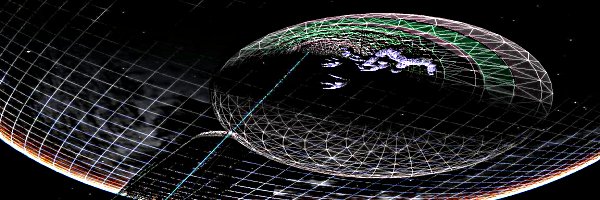BY LETTER
Virchbuilder Packages
Technology > Application > Communications
Galactography > Cybercosm, The
Technology > Application > Envirotech
Technology > Application > Everydaytech
Technology > Technology Levels > High Tech / Hitech
Technology > Application > Software
Sophonts > Modosophonts > Virtual
Technology > Technology Type or Material > Virtual/Infotech
Galactography > Cybercosm, The
Technology > Application > Envirotech
Technology > Application > Everydaytech
Technology > Technology Levels > High Tech / Hitech
Technology > Application > Software
Sophonts > Modosophonts > Virtual
Technology > Technology Type or Material > Virtual/Infotech
Types of software used to create virtual worlds. |
 Image from Steve Bowers |
Virchbuilder software packages vary in capability; most include sophisticated AI routines but are not necessarily sophont themselves. A modosophont user may use such a software package to create a complex virchuniverse without worrying too much about the finer details.
The most basic ones give the user a number of generic 'template' virch worlds, usually of the more common types, which the user can then customise to their own needs, though usually only at a merely cosmetic level. Mid-level virchbuilders give more ability to customise the templates, giving the user control of many more aspects of the virch world. Top-end virchbuilders give the user total control of all aspects of the virch world they are building, and also allow the user to build virch worlds entirely from scratch rather than from a template. In most cases the capability of the virchbuilder also determines how much control of the properties of their world the inhabitants of the virch have once their world is running.
In most cases aspects of the virch world are specified by assigning positions along the axes of whatever virch classification system the particular virchbuilder uses and then tweaking the resultant world to get exactly the world required.
Security holes in virchbuilder software are one of the more common routes by which virch worlds created by them can be attacked. This is especially the case when the virchbuilder has given the inhabitants of a given world a great deal of control over it, when security holes allow others to take advantage of this control. Bespoke virch worlds are usually much more secure, but also take much more time and effort to create.
Virchbuilder programs used by modosphonts often resemble, and are in some part derived from, Art Generator Software using verbal or direct neural interfaces. The most sophisticated, and yet the simplest to use, are derived from transapientech packages, most of which include some form of transapient oversight.
Related Articles
- Art Generator Software
- Classification of Virch Worlds, The
- Cybercosm - Text by M. Alan Kazlev
Generic term for any virchworld in or apart from the Known Net; a subdivision of the Cybercosm. - Cybercosm, The
- Virch
- Virchers
- VirchGods
- VirchMon
- Virchology
- Virchophobia - Text by Thorbørn Steen
Virchophobia is the irrational fear of virches. Virchophobes who find themselves in a virch will suffer from anything from restless anxiety to full-scale panic attacks. Generally virchophobes have no trouble avoiding virches, and once they have realized their disorder will be able to live almost normal lives. Virchophobia sometimes includes the fear of virtuals or a-life, but these fears are generally classified separately. - Virchspace - Text by M. Alan Kazlev
Any digital space or environment; pertaining to virch or a cybercosm. - Virchuniverse - Text by M. Alan Kazlev
Generally, an aggregation or collection of thousands of interconnected virchworlds or cybercosms, all sharing the same basic ontology and lay-out, to make traveling from one to the other easier. Sometimes also used to designate a single extremely large virchworld. - Virchworld
- Virtual Drugs
- Virtual Gardens
- Virtual Gibson - Text by M. Alan Kazlev
Minor post-ComEmp Cyberian fastime clade found throughout the Known Net. Achieved brief fame when they established a trade pact with The Orthodox Diamond Light in 6932. They had a complex cybertheology, which involves the "giving of data" by virchdeities. It was claimed that some of their members are original infomorphs (or copies thereof) of the some of the original Interplanetary Age gibson sect, but this has never been reliably confirmed. Nothing has been heard of them since the "Case Manifesto" of 7612. - Virtual Haven
- Virtual Labyrinths
- Virtual Particle - Text by Anders Sandberg
Quantum field theory allows particle-antiparticle pairs to borrow energy from the vacuum to come into existence as long as they vanish again within the time set by the Heisenberg Uncertainty Principle. The result is that the vacuum is filled with virtual particles, themselves undetectable but their collective effect visible in the form of screening effects of charged particles, the Casimir Effect and Visser decay of wormholes. - Virtual Reality
- Virtual Rights - Text by Max More in Anders Sandberg's Transhumanist Terminology
Rights given for convenience to a partial; these rights are really rights of the person whose partial it is, rather than of the partial itself. Similar in some respects to currently existing corporate rights. - Virtual Sex - Text by M. Alan Kazlev
Sex in virtual reality incorporating a visual, auditory, and tactile environment. The sex partner can be a real or simm person. - Virtualics - Text by Anders Sandberg
Science and art of engineering, designing, and/or studying virtual worlds and universes. - Virtualism - Text by Anders Sandberg
The belief, common among many long-term virchers and long-term copies, that only virch is real, and ril is an illusion. - VR
Appears in Topics
Development Notes
Text by Tony Jones
Initially published on 03 September 2003.
Initially published on 03 September 2003.






